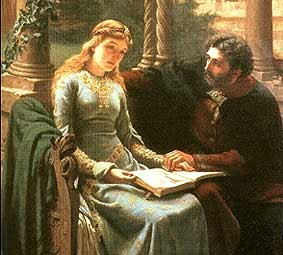
[This entry was based off a series of medieval literature texts which can be found at this website: http://www.sacred-texts.com/chr/aah/index.htm]
Growing up in a small town like Millersville, there were few people to meet, fewer friends to play with, and no way to burn off excess childhood energy. I learned to read at a young age to fight boredom, and thanks to the local library I spent my evenings fighting pirates with Peter Pan or solving mysteries with Nancy Drew. The written word is a powerful addiction, and as I grew older I found that letters, texts, or emails from a handsome young man who shares your interests and has a sense of humor to match can be equally attractive. As we grow wiser in the ways of the world, we replace our fictional ideologies with those we find in reality, putting our childhood behind us but never forgetting what they inspired us to accomplish.
The letters between Abelard and Heloise depict a story of forbidden love, obsession, and knowledge. Just as Eve represents the temptation of knowledge, Heloise represents the temptation of a bright, beautiful, “modern” woman for her time. Abelard falls for her, as any self-respecting scholar might, since their wit and intellects are a perfect match. Ultimately, it is vanity and pride that bring the lovers to misery. It is apparent through their letters which express the strong feelings these two felt for one another that even though they were forcibly separated by a vengeful uncle and by vows to holy orders, Heloise and Abelard would remain connected through their memories of love.
It was not until recently, in 1998, that the
The letters between Heloise and Abelard are heavy with philosophy, spirituality, and infatuation. They also show the growth of both literary figures. Abelard wished to marry Heloise in secret to protect his honor and reputation, and she would rather have been his mistress than his wife. To tie him down in marriage would be to hold him back, to prevent him from taking the opportunities that would present themselves to him in the future. It takes a mature, selfless woman to tell the man she is in love with “no, I will not marry you and keep you from doing what you love.” When Fulbert discovered that Abelard had convinced Heloise to intern herself in a convent, he assumed that Abelard was ridding himself of Heloise and his responsibilities to her. Fulbert’s punishment for Abelard was a ruthless mutilation and castration, an action that most overprotective father figures would admire. Unfortunately, after all the care both Heloise and Abelard took to protect their dignity, Abelard would never be able to walk confidently among his equals again. After becoming the abbess of a convent, Heloise no longer thought only of protecting Abelard, but of providing for the women in her care. Abelard states in his Apologia exactly how their relationship has grown: “Heloise, my sister, once so dear to me in the world, today even dearer to me in Jesus Christ […].” Once both were installed in their respective religious orders, each recognized the futility of their marriage, though they remained in love with one another, it was a new love sanctified by their love of God. The letters between Heloise and Abelard were never meant to published, they were intimate glimpses into the affair.
Never underestimate the power of a fictional character to encourage even the most depressed teenager to wake up every day, just as an attractive professor may find his 8 AM class filled each morning (Dr. Indiana Jones comes readily to mind). The pain of lost love stings deep and we never forget the feeling of caring more for one man than we cared for ourselves. Heloise and Abelard wrote from their hearts, and their eloquence reveals a common sadness of love gained and lost. It is the journey each young woman must make to bridge that gap between childhood and adulthood.
Bibliography
Dank, Barry M., and Klaus de Albuquerque. "Banning Sexual Asymmetry on Campus." Electronic Journal of Human Sexuality 1 (1998): n. pag. Electronic Journal of Human Sexuality. Web. 19 Feb. 2010.
"The Love Letters of Abelard and Heloise Index." Internet Sacred Text Archive Home. N.p., n.d. Web. 20 Feb. 2010.

